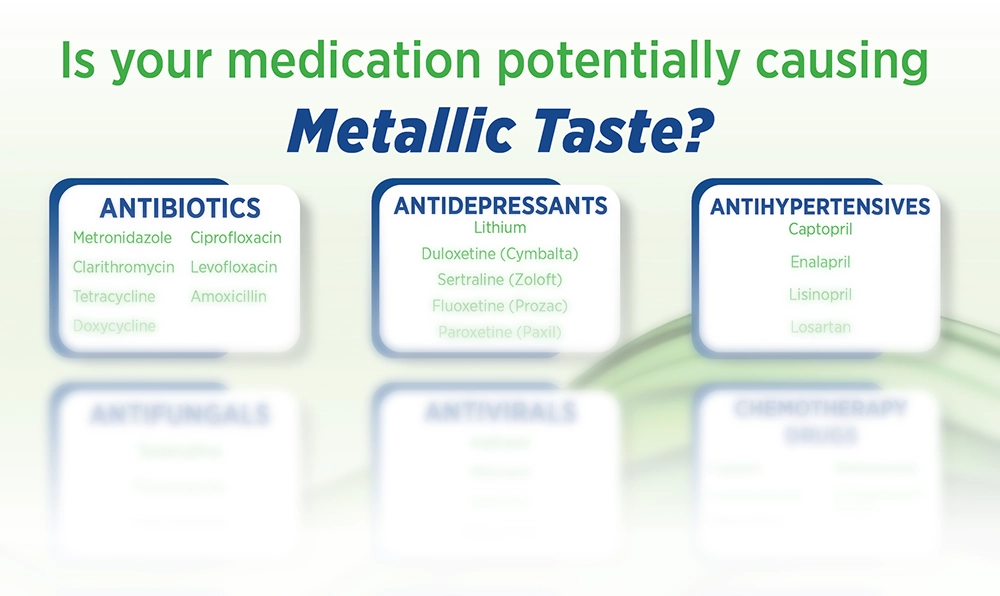

Having a bad taste in mouth is not fun and can mess with your day-to-day life. It’s important to figure out why this is happening if you want to fix it. This problem could come from issues with your oral health or something else going on in your body. By looking into the main reasons behind it and finding ways to deal with them, including the most common causes of bad taste, you can learn how to make things better, which helps improve both your oral health and how good you feel overall.
Having a bad taste in your mouth isn’t just annoying; it might be hinting at something more serious. It’s important to realize that this issue is about more than just your taste buds. It involves the health of your mouth, how you sense flavors, and other body-wide factors, including your sense of smell. By paying attention to whether the bad taste is bitter, metallic, or sour, you can start figuring out why it’s happening—maybe because of how well you’re taking care of your teeth and gums, certain health problems you have or things you do every day, such as poor dental hygiene. Looking closely at how we perceive tastes helps us understand the complex reasons behind this bothersome feeling.
If you ever find yourself with a bad taste in your mouth, it’s important to figure out what kind of unpleasant flavor you’re dealing with. You might notice a metallic taste, something bitter, sour, or even rancid, which could be signs of serious illnesses such as diabetes, dementia, liver disease, kidney disease, or certain cancers. These different tastes could also be telling you about various problems like issues with your oral health, infections you might have, the way you eat, or other bodily conditions. By knowing exactly which type of unpleasant taste is bothering you, such as those associated with liver problems, you can lead the way to finding out why it’s happening and how to make it better.
When it comes to a bad taste in your mouth, things like oral health problems, infections, and what you eat are usually behind it. Not taking good care of your teeth can lead to an excess of bacteria hanging around in there, which not only gives you bad breath but also leaves a nasty taste. On top of that, getting something like oral thrush or an infection in your sinuses, such as the common cold, can mess with how things taste to you. Eating foods that are really acidic or super spicy might leave you with a bitter or metallic flavor lingering on your tongue. Figuring out these issues and tackling them is key if you want to get rid of that unpleasant taste.

A dry mouth is another common issue which cuts down on saliva and makes tastes less vibrant. There are also gum diseases and infections; these can leave a bitter or metallic flavor lingering in your mouth due to poor oral hygiene. Additionally, certain medications and cancer treatments, such as chemotherapy, can also contribute to a weird taste in your mouth. Treating any dental issues and improving your oral hygiene habits can improve the taste and prevent further problems. Keeping up with brushing and flossing is key to avoiding these issues so your sense of taste stays sharp. Going for regular check-ups at the dentist’s office can help catch any problems early on. Once treated properly, not only will those bad tastes go away but eating will also become more enjoyable again.
Common causes of bad taste in the mouth include poor oral hygiene, dry mouth, smoking, certain medications, infections in the mouth, and acid reflux. It’s essential to address these underlying issues to alleviate bad taste and maintain oral health.
Sometimes, health conditions like infections or sicknesses can make your mouth taste bad. For example, oral thrush is a fungal problem in the mouth that leaves you with a constant unpleasant taste. On top of that, sinus infections or problems with breathing might lead to mucus dripping down the back of your throat, which can be a sign of a viral infection such as respiratory infections, tonsillitis, or the common cold. These infections can also cause an unpleasant taste and may be accompanied by congestion or an earache. It’s important to take care of these issues quickly so you can get rid of the bad taste and feel better about your mouth’s health. Getting help from a doctor for proper diagnosis and treatment is key to dealing with these problems well.
Eating certain foods or having specific habits might leave you with a bad taste in your mouth. When you eat spicy or acidic foods, have too much sugar, or don’t drink enough water, it can make your mouth feel not so great. On top of that, smoking and drinking a lot of alcohol can mess with how healthy your mouth is and change the way things taste to you. By keeping up with a diet full of good nutrients and making sure to stay hydrated, you can get rid of that nasty taste in your mouth and find temporary relief. So, by watching what you eat and how you live day-to-day, improving both oral health and the way food tastes becomes easier.
Keeping your mouth healthy is key to making sure food tastes as it should. Taking care of your teeth and gums plays a big part in stopping bad flavors from popping up in your mouth. Problems like oral thrush mess with the natural balance inside, changing how things taste. If you don’t look after your oral health, you might end up with a bitter or metallic flavor lingering on your tongue.
Taking care of your teeth and gums is key to avoiding that yucky taste in your mouth. By brushing, flossing, and seeing the dentist regularly, you keep your mouth healthy and stop problems like gum disease or infections that can make things taste bad. If you don’t look after your dental hygiene, an excess of bacteria can grow in there. This not only leads to bad breath but also changes how things taste to you. Keeping a clean mouth with good oral hygiene habits is really important for keeping everything balanced inside and stopping those unappealing tastes from happening.
When you smoke a lot or drink large amounts of alcohol, it can make your mouth taste bad. Smoking affects your teeth and gums, leading to problems like gum disease and cavities. It also makes your mouth dry and can dull how well you taste things because the tobacco particles coat your tongue.
Drinking a lot of alcohol does similar things—it dries out your mouth and changes how things taste to you. If you drink too much, it might even dehydrate you, making less saliva available in your mouth which leads to that dry feeling. Your taste buds won’t work as they should either; everything might start tasting bland or just plain bad. Additionally, smoking can also contribute to dry mouth and nerve damage, leading to changes in taste and potential dental issues.
If you cut down on smoking and/or drinking—or stop altogether—you’ll likely see an improvement in both oral health and sense of taste. Getting help from a doctor or joining a support group can be really useful if you find quitting difficult.
Metallic taste is a taste disorder medically known as dysgeusia. It is an abnormal, impaired sense of taste, or an unpleasant alteration of a taste sensation. Those who are affected often describe the condition as having a persistent metal, rancid, sour, or bitter taste. Because of this issue a lot of them find eating to be bothersome and choose to avoid it. What if I told you that there is a product on the market that could help?
There is only one product on the market today that works for Metallic taste, MetaQil. This product was developed to help people try to combat the unusual taste in their mouth. MetaQil is an innovative oral rinse that can help relieve the symptoms of Dysgeusia, Metallic Taste, and provides long-lasting comfort and fresh breath. MetaQil has a mild flavor and doesn’t “Sting” the mouth like an everyday mouthwash might be due to it being alcohol-free. The ingredients comprising its formula are also sugar-free, gluten-free, vegan friendly, and contain no parabens or sulfates.
To make your taste better, there are a bunch of different steps you can take. At home, keeping up with good oral hygiene is key. Following some of these ideas can help guide you in the right direction.
1- Oral Hygiene Practices
2- Hydration and Diet
3- Stress Management
4- Home Remedies
5- Addressing Specific Causes
Wrapping things up, if you’re dealing with a bad taste in your mouth, it’s important to figure out why it’s happening. This could be because of problems with your teeth and gums, other health issues, or even the way you live your life. To make things better, focus on keeping your mouth clean, getting rid of any infections and thinking about what foods you eat. It’s worth noting that when the way things taste to us starts changing; it might mean there’s something bigger going on health-wise. So, if this problem doesn’t go away quickly by itself or gets worse over time, then talking to a doctor is a smart move for anyone facing these symptoms. By being ahead of the game and getting the right help when needed, not only can you improve oral hygiene but also boost your overall well-being.
Sometimes, you might notice that things don’t taste the way they used to. This can happen out of the blue and for many reasons. Things like getting sick, changes in your body’s hormones, what you eat, getting an infection, or even damage to nerves can mess with how foods taste to you. It’s really important to talk with your doctor if this happens so they can figure out why it’s happening and how best to fix it. They’ll investigate all the possible causes – like health conditions, hormonal shifts, or nerve issues, and any other factors that could be behind those sudden changes in your sense of taste.
Indeed, stress plays a role in causing an unpleasant taste in your mouth. It messes with your hormonal balance and sense of taste, which can make things taste bad. On top of that, if you’re already dealing with health issues, stress can make those worse and add to the problem of experiencing a bad taste.
Stress can indeed contribute to an unpleasant taste in your mouth. Here are some ways stress affects your oral health and taste:
Understanding the link between stress and bad taste can help you address the root cause and improve your overall well-being. Managing stress through relaxation techniques, maintaining good oral hygiene, and seeking professional help when needed are essential steps to mitigating these effects.
After fixing the root problem, how long it takes for your taste to get back to normal can differ. It’s all about what was wrong and how you’re treating it. For some people, their sense of taste gets better pretty fast. But for others, it might take a bit more time – potentially days to weeks or maybe even months. This timeline really hinges on how serious the underlying cause was and other personal factors that come into play with each person’s treatment plan.
